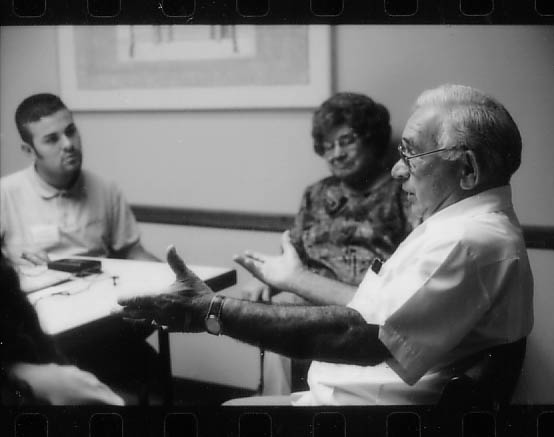Oral History
Oral History can reveal the everyday life of a community-its concerns, tragedies, traumas, high points and leisure moments. Oral History interviews can provide valuable first person information on a place, a period of time, an activity or event. These interviews can also provide insights into how the lives of local residents are shaped by social movements and major events outside of the community.
In Historic Preservation, Oral History allows us to retrieve the history of whole communities, their buildings, structures, sites and cultural landscapes. The interviews we collect document how the residents lived and worked, their contribution to the life of community, how they influenced building styles and uses, how they shaped their physical environment, and the larger context in which the community was created and sustained.
Guerra & McBane provides a full range of Oral History services, from initial project design to project management. Oral Histories may be used to create documentation (audio or video, transcript, and photos) where archival research is limited. Staff and Volunteer Training Workshops and Webinars may be incorporated into major projects. We can also help you incorporate oral histories into interpretive projects, broadcast, exhibit or performance works.
In designing our projects, Guerra & McBane prefers to work collaboratively with the community whenever possible. Building trust and respect among participants is especially important for projects in women's, ethnic or non-white communities and previously undocumented places. Preliminary research is often conducted in personal collections as well as local archives, cultural centers, libraries or community organizations. Our project team often includes student and community-based volunteer researchers, interviewers and transcribers as available.
Multi-Faceted Oral History Projects
One interview can provide insight. A set of interviews can provide corroboration of research obtained from other sources, identify relationships between a group of people and a specific place; or identify potentially new areas of research. Oral History in combination with Historic Preservation helps:
-
Identify the places that are culturally and/or historically significant to the people who have lived here.
-
Record locally important events and activities, and the sites where these occurred.
-
Explain how major national and international social and political events influenced the community.
-
Identify people that were influential in the life of the community
-
Describe how community life has adapted to change over time.
-
Document the history or under-represented community or ethnic groups, unique local traditions, businesses or activities.
-
Identify aspects of recent history, and potentially significant resources that may not yet be formally recorded in archives or other research projects.

